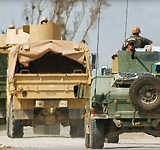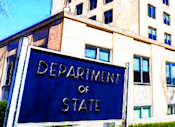 The Directorate of Defense Trade Controls (“DDTC”), the State Department agency responsible for licensing exports of defense articles, has issued new guidance to scold export license applicants for not using precise names legal names in license applications. Like confusing “that” for “which” and vice versa, minor name inaccuracies begin the legendary slide down the even more legendary slippery slope that winds up in terrorists being able to mail nuclear bombs from Des Moines to Pakistan by simply dropping the bombs in the corner mailbox with the correct postage.
The Directorate of Defense Trade Controls (“DDTC”), the State Department agency responsible for licensing exports of defense articles, has issued new guidance to scold export license applicants for not using precise names legal names in license applications. Like confusing “that” for “which” and vice versa, minor name inaccuracies begin the legendary slide down the even more legendary slippery slope that winds up in terrorists being able to mail nuclear bombs from Des Moines to Pakistan by simply dropping the bombs in the corner mailbox with the correct postage.
An applicant must ensure the correct spelling is used when entering the legal business name(s) of any involved party. … Failure to adhere to these guidelines may result in a delay in review of a license application or a return without action (RWA).
Because if the intermediate consignee is listed as FeddEx rather than FedEx, DDTC’s licensing staff will be completely confused and will have no choice but to return the application or to delay it a few weeks while figuring out whether there really is a FeddEx or not.
Even more importantly we have the national security threat of names without middle initials.
When completing any online license application and an individual’s name is required, the middle name or initial should be provided.
For those who are inclined to scoff at this school-marmishness, let me point out the unstated goal behind this emphasis on disclosing middle initials. While most American’s have middle names, that is quite uncommon in the case of Arabic names, so the absence of a middle initial can be a good marker that a potential terrorist might be involved in an export application.
Seriously, the new guidance might have been more helpful if it dealt with the middle-named-challenged in the same way as these tips from DDTC on filling out DDTC’s Form DS-2032 for registration of manufacturers and brokers:
If no middle initial, enter “N/A.”
So if you’re wondering how to get permission for America’s first president, who had no middle name, to export a defense article, just list the applicant as “George N/A Washington.” I like the sound of that, don’t you? And it has the added advantage of keeping us all safer.

 Posted by
Posted by  Category:
Category: 

 The speech given this morning by Secretary of Defense Robert Gates to a business group detailing the administration’s plan for export reform is now posted on the Department of Defense website and can be found
The speech given this morning by Secretary of Defense Robert Gates to a business group detailing the administration’s plan for export reform is now posted on the Department of Defense website and can be found  If the potential benefits of a voluntary disclosure of export violations to the Directorate of Defense Trade Controls (“DDTC”) are not a sufficient motivation, exporters should remember that today’s happy employee can be tomorrow’s disgruntled former employee. The disgruntled former employee is then happy in only one respect: all too happy to blow the whistle on the exporter’s alleged violations of export laws.
If the potential benefits of a voluntary disclosure of export violations to the Directorate of Defense Trade Controls (“DDTC”) are not a sufficient motivation, exporters should remember that today’s happy employee can be tomorrow’s disgruntled former employee. The disgruntled former employee is then happy in only one respect: all too happy to blow the whistle on the exporter’s alleged violations of export laws. In a laudable moment of regulatory clarity, the Directorate of Defense Trade Controls (“DDTC”) has actually
In a laudable moment of regulatory clarity, the Directorate of Defense Trade Controls (“DDTC”) has actually  Last week, in his
Last week, in his 

